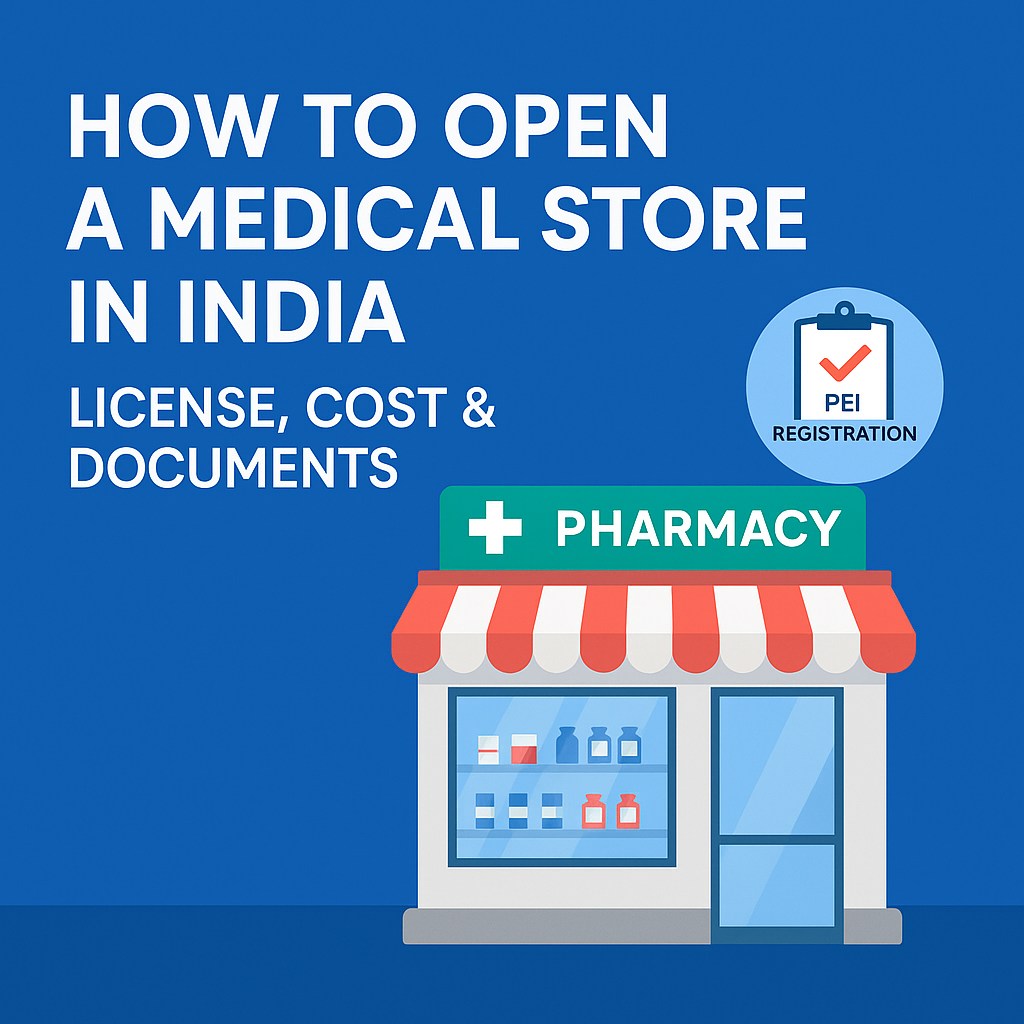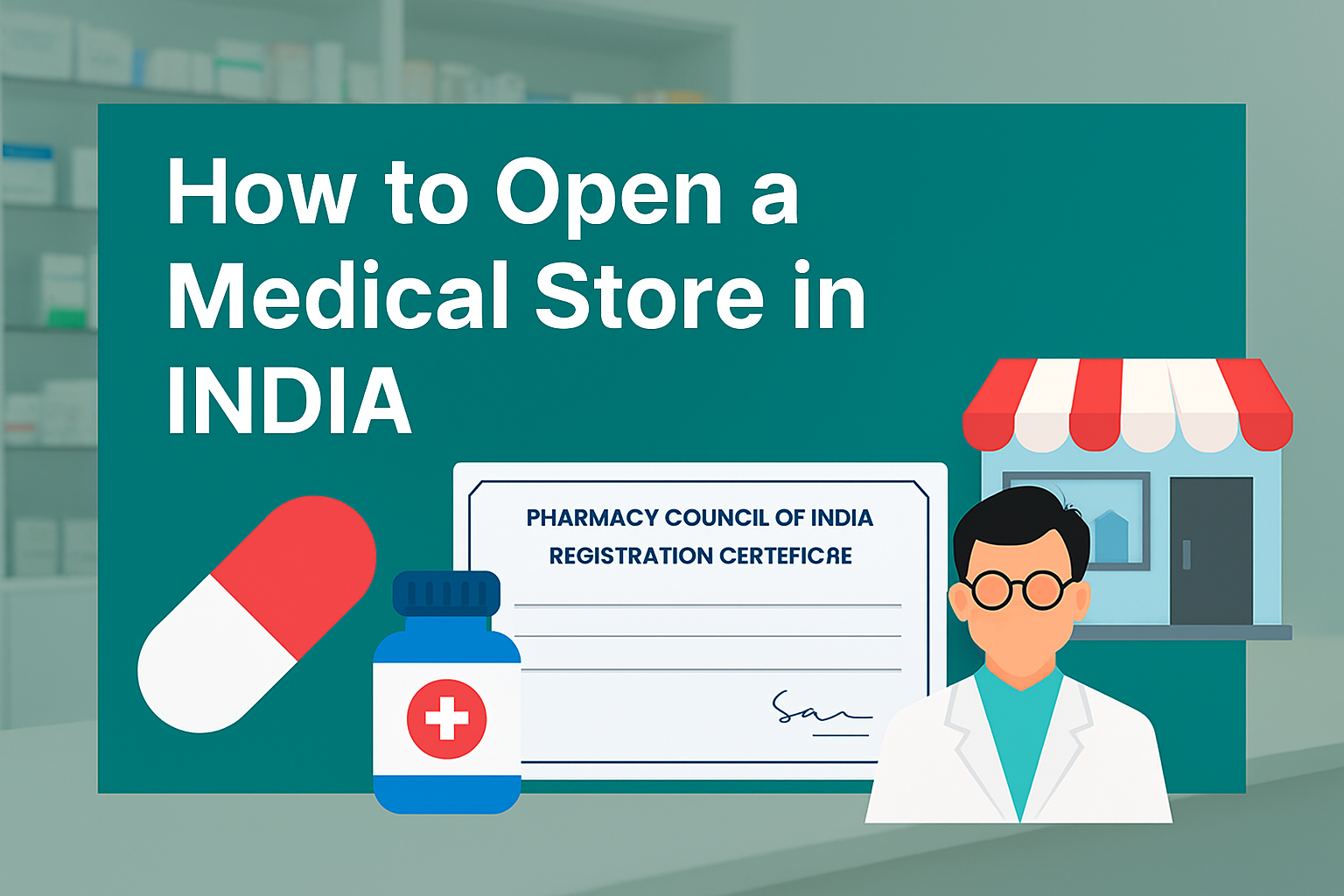Introduction
Thinking of starting a medical store in India? You’re not alone. With rising demand for quality healthcare and medicines, opening a pharmacy in 2025 is one of the most stable and respected business opportunities available. Whether you’re a qualified pharmacist or an investor planning to hire one, setting up a Medical store can bring both financial rewards and the satisfaction of serving your community.
In this guide, we walk you through everything you need: the types of Medical stores you can open, legal requirements, licenses (including PCI registration), investment costs, documents, and a step-by-step process to start your pharmacy the right way.
What Type of Medical Store Can You Open?
The first step is deciding the format of your pharmacy. Different models suit different business goals:
🏥 1. Retail Pharmacy (Chemist Shop)
This is the most common setup—where you sell medicines directly to customers based on a valid doctor’s prescription. Perfect for local neighborhoods and residential areas.
📦 2. Wholesale Pharmacy
Wholesale stores supply medicines in bulk to other pharmacies, hospitals, and clinics. You’ll need specific licensing and more space.
🧬 3. Franchise Pharmacy Store
Operate under popular brands like Apollo, MedPlus, or 1mg. These come with brand recognition, ready infrastructure, and support—but often higher investment.
🌐 4. Online Pharmacy
Selling medicines online has boomed post-COVID. If you plan to enter e-commerce, you’ll also need GST registration, e-pharmacy permissions, and digital infrastructure.

Who Can Open a Medical Store? (Eligibility & PCI Requirements)
✔️ Qualifications Required:
To open and run a Pharmacy store, either you must be a qualified pharmacist or hire a full-time registered pharmacist.
Minimum Educational Qualifications:
- D.Pharm (Diploma in Pharmacy)
- B.Pharm (Bachelor of Pharmacy)
🎓 Mandatory PCI Registration
Every pharmacist must be registered with the Pharmacy Council of India (PCI) and have a valid State Pharmacy Council certificate. PCI registration is non-negotiable—it’s your license to practice pharmacy and get the drug license approved.
Licenses Required to Start a Pharmacy in India
Setting up a medical store involves multiple licenses and approvals. Here’s what you’ll need:
💊 1. Drug License
Issued under the Drugs and Cosmetics Act, 1940 by the State Drug Control Department.
Types:
- Retail Drug License (RDL) – For retail chemist shops
- Wholesale Drug License (WDL) – For large-scale supply businesses
🧾 2. GST Registration
Mandatory if your turnover exceeds ₹20 lakh (₹10 lakh in special category states). Required for buying/selling medicines with tax compliance.
🏬 3. Shop & Establishment License
Obtain this from your local municipality. It legalizes your commercial operations and is compulsory for all retail outlets.
🍽️ 4. FSSAI License (Optional)
Required only if you plan to sell nutraceuticals, food supplements, or wellness products.
Documents Required for Medical Store Registration
To obtain a drug license and start operations, gather the following:
📑 For Pharmacist:
- D.Pharm/B.Pharm degree certificate
- PCI registration certificate & State Pharmacy ID
- Aadhar & PAN Card (ID proof)
🏠 For Store Premises:
- Rent agreement or property ownership deed
- Electricity bill/property tax slip
- Layout plan/blueprint of the store
🧾 Additional:
- Application form (as prescribed)
- Refrigerator & air conditioner details
- Affidavit stating no past convictions under Drugs Act
- Appointment letter of registered pharmacist
What’s the Cost to Open a Medical shop
Opening a pharmacy is relatively low-cost compared to other businesses. Here’s a rough breakdown:
| Item | Estimated Cost (INR) |
| Drug License Fees | ₹5,000 – ₹15,000 |
| Shop Rent & Advance | ₹10,000 – ₹50,000/month |
| Interior Setup | ₹50,000 – ₹1.5 lakh |
| Initial Medicine Inventory | ₹1.5 lakh – ₹5 lakh |
| Refrigerator & AC | ₹30,000 – ₹60,000 |
| Computer/Billing System | ₹20,000 – ₹40,000 |
| Miscellaneous Expenses | ₹20,000+ |
| Total Investment | 3 lakh – 7 lakh |
Minimum Area Requirement
Your pharmacy must meet space guidelines set by CDSCO and State Drug Authorities.
- Retail Pharmacy: Minimum 10 square meters
- Wholesale Pharmacy: Minimum 15 square meters
Your store must have:
- A refrigerator for temperature-sensitive drugs (e.g., insulin, vaccines)
- Air conditioning or adequate cooling
- Proper racks and counters for storage
Step-by-Step Process to Open a Medical store in India
Follow these steps carefully to stay legally compliant:
✅ Step 1: Select a Suitable Location
Choose a spot with good visibility and footfall. Ensure it’s a commercial property or legally converted residential space.
✅ Step 2: Hire a Registered Pharmacist
If you’re not a pharmacist, employ one with a valid PCI and State Council registration.
✅ Step 3: Apply for Drug License
Visit your State Drug Control Department or apply online. Submit all required documents. An inspector will visit your premises before approval.
✅ Step 4: Register for GST
Apply via the GST portal using your PAN, address, and business type.
✅ Step 5: Get Shop & Establishment License
Apply through your local municipal authority—some states offer online application portals.
✅ Step 6: Set Up Infrastructure
Purchase essentials like racks, billing counters, AC, and fridge. Install CCTV and fire safety equipment if possible.
✅ Step 7: Buy Initial Medicine Stock
Start with essential medicines from certified wholesalers or pharma distributors.
✅ Step 8: Begin Operations
Display your licenses clearly. Maintain record books, expiry logs, and ensure the pharmacist is present during store hours.
Profit Margin in a Medical Store
Your earnings depend on the product mix. Here’s a typical margin chart:
- Branded Medicines: 15% – 25%
- Generic Medicines: 30% – 200%
- Surgical/OTC/FMCG Products: 10% – 20%
Pro Tip: Selling a mix of generics, OTC products, and branded drugs can boost your profit. Many store owners report 15%–20% ROI per month if located strategically.
Common Mistakes to Avoid
- ❌ Not hiring a full-time registered pharmacist
- ❌ Operating from a residential area without commercial clearance
- ❌ Selling prescription-only drugs without a valid script
- ❌ Ignoring mandatory PCI registration
- ❌ Poor bookkeeping or expired licenses
FAQs – Opening a Pharmacy in India
Q1. Can a non-pharmacist open a Medical store?
Yes, but only if you employ a full-time registered pharmacist with valid PCI credentials.
Q2. How long does it take to get a Drug License?
Usually within 30 to 45 days, depending on your state and completeness of documents.
Q3. Can I run a Medical store from home?
Only if the premises is legally converted to commercial use and meets area & infrastructure requirements.
Q4. Do I need PCI registration to run the shop?
Yes, either you or the employed pharmacist must hold valid PCI and State Council registration.
Q5. Is it mandatory to install a refrigerator?
Yes. Certain medicines like vaccines and insulin must be stored between 2°C to 8°C.
Conclusion
Opening a pharmacy shop in India in 2025 is not just a smart business move—it’s a way to serve your community and build a stable source of income. With the right location, proper licenses (especially PCI registration), store setup, and full compliance with regulations, you can successfully run a pharmacy shop that’s both profitable and trusted.
👉 Visit PharmacyProfessor.com


Thank for sharing information
Help me for opening my medical store again thank